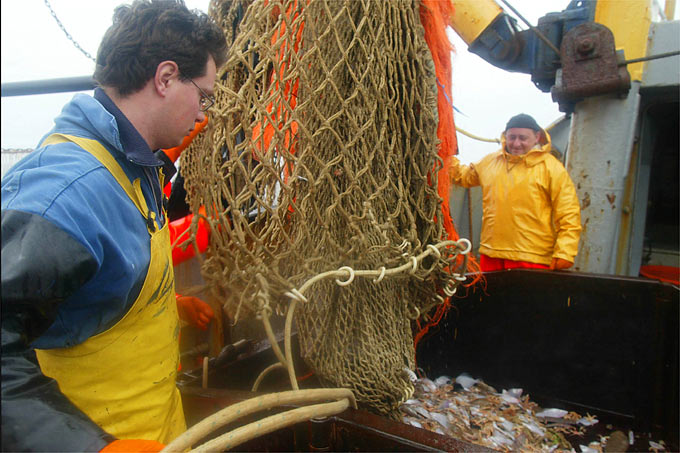Empty oceans
Europe‘s Common Fisheries Policy (GFP) - a complete failure?
On the contrary, more than 25 years of short-term economical interests and political maneuvering by EU Member States dominated the scene. In 2007, the Community Fisheries Control Agency, an institution within the European Court of Auditors, observed that the CFP had fallen short of meeting its objective to realise sustainable fishing activities. The „Green Paper on the Reform of the CFP“, published by the European Commission in 2009, clearly exposes the reasons for these shortcomings.
What has gone wrong:
- Too many fishing vessels - current estimates show that catch capacities of individual fleet segments are two to three times higher than the number normally required to maintain sustainable catch quotas.
- Excessive catch quotas - fishing quotas recommended by the International Council for the Exploration of the Sea (ICES), a network of more than 1,600 scientists, have been regularly overstepped for years. In recent years, politically negotiated quotas were on average 48 percent higher than quotas recommended by the ICES.
- Destructive fishing techniques - many of the fishing techniques currently in use, in particular bottom trawling , have disastrous effects on benthic ecosystems and fall short of fishing selectivity on specific target species.
- Incidental by-catch too high - too many fish are caught that cannot be sold, because they are too young or because a catch quota has not been declared. But not only fish become entangled in the nets. Countless seabirds, sea turtles, marine mammals and invertebrates are the unfortunate and unsuspecting victims of indiscriminate fishing practices.
- Deficits in controls and enforcement - only a small proportion of fishing vessels are observed effectively (vessels over 15 m in length). At-sea observer schemes do not cover smaller, non-industrial vessels.
- Failed subsidies policies - the EU continues to grant subsidies for the modernization of fishing fleets rather than investing in the reduction of fleet capacity and promoting more environmentally-friendly fishing techniques.
What is NABU doing?
NABU actively participates in the urgently needed reform process of the CFP. NABU along with the umbrella organization - BirdLife International - is involved in the EC consultation process.
In discussions with politicians and diverse stakeholders, we encourage the promotion of sustainable fisheries management based on healthy fish stocks and environmentally-friendly fishing practices. Scientific papers on the negative effects of current fishing practices demonstrate the acute need for action.
Since April 2010 NABU has been a member of “Ocean 2012”, a coalition of organizations working within the framework of the reform of the CFP on overfishing with the aim to end destructive fishing practices and introduce appropriate and fair use of fish stocks.
What can you do?
- Stop buying and consuming endangered species such as sharks and tuna.
- From today onwards buy only seafood that originates from sustainable fisheries certified by the „Marine Stewardship Council“ (MSC) or by organic associations (such as “Naturland” or “Bioland” in Germany).
- Support NABU and other nature conservation organizations in their efforts to promote sustainable fisheries.
more Information
An ecosystem is a complex of living organisms. NABU focuses on restoring ecosystems to their original state and important regulatory functions such as carbon sequestration. Ideally, by creating conditions in which the ecosystem can recover on its own. more →

